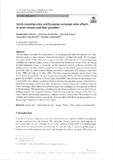| dc.contributor.author | Gkillas, Konstantinos | |
| dc.contributor.author | Vortelinos, Dimitrios I. | |
| dc.contributor.author | Floros, Christos | |
| dc.contributor.author | Garefalakis, Alexandros | |
| dc.contributor.author | Sariannidis, Nikolaos | |
| dc.date.accessioned | 2022-01-17T16:05:45Z | |
| dc.date.available | 2022-01-17T16:05:45Z | |
| dc.date.issued | 2020-11 | |
| dc.identifier.issn | 0254-5330 | |
| dc.identifier.uri | http://hdl.handle.net/11728/12098 | |
| dc.description.abstract | In this paper, we study the contribution of the geographical (both the regional and international) aspect of news releases, related to the Greek sovereign debt crisis. We investigate the impact of the Greek debt crisis via economic news and surprises on Euro exchange rate volatility and volatility-jumps within a Tobit regression framework. In particular, the impact of three categories of news is examined via the respective number of dummy variables, the number of news per day, and news surprises of 2-year, 5-year and 10-year government bonds and CDS. Also, the role of news releases providers is researched. The analysis starts from 1 July 2009 and ends on 31 May 2015. The data comprises intraday prices for (1) Euro to US dollar (Euro/USD), (2) Euro to Japanese yen (Euro/JPY), (3) Euro to Great British pound (Euro/GBP), (4) Euro to Swiss franc (Euro/CHF) and (5) Euro to Australian dollar (Euro/AUD). Our findings reveal that Greek events have an important impact on the behavior of the Euro exchange market. Secondly, the identity of the provider of news releases about the Greek sovereign crisis affects Europeś exchange rates highlighting homogeneity problems in the Eurozone. The uncertainty, introduced by the Greek sovereign crisis, as shown by our findings, signifies the financial instability in the Eurozone and the strength of the Euro currency. This is vital for policymakers in a common currency environment. Policymakers could evaluate such findings and re-examine the structural plan of the Euro, targeting primarily at the financial integration of the member states. | en_UK |
| dc.language.iso | en_US | en_UK |
| dc.publisher | Springer Verlag | en_UK |
| dc.relation.ispartofseries | Annals of Operations Research (ANN OPER RES);vol. 294, no. 2, pp. 515-536, 2020 | |
| dc.rights | © Springer Science+Business Media, LLC, part of Springer Nature 2020 | en_UK |
| dc.rights.uri | http://creativecommons.org/licenses/by-nc-nd/4.0/ | en_UK |
| dc.source.uri | https://link.springer.com/article/10.1007/s10479-019-03199-x | en_UK |
| dc.subject | Research Subject Categories::SOCIAL SCIENCES::Business and economics | en_UK |
| dc.subject | Greek news | en_UK |
| dc.subject | Realized volatility | en_UK |
| dc.subject | Jumps | en_UK |
| dc.subject | Policy | en_UK |
| dc.subject | Tobit regression framework | en_UK |
| dc.title | Greek sovereign crisis and European exchange rates: effects of news releases and their providers | en_UK |
| dc.type | Article | en_UK |
| dc.doi | 10.1007/s10479-019-03199-x | en_UK |


